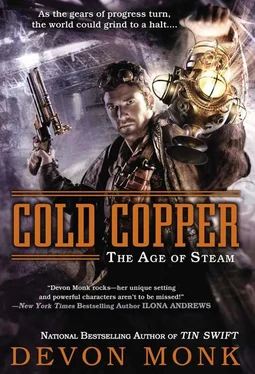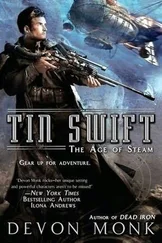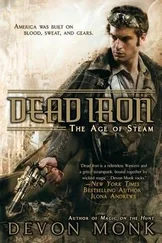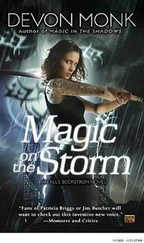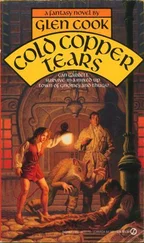“I really don’t think there’s a need for guns,” Wicks was saying. “I assure you we mean no harm. This was just an unfortunate misunderstanding. Perhaps if we could speak with Mayor Vosbrough, we could explain our case and apologize properly.”
“You’ll see him,” a man with a scar on his face said. “Walk.”
The tunnel did indeed end in a door, which one of the men had opened, letting the rising dawn breeze in. Rose paced up the sloped floor behind Hink, and then through the door and up a ramp that must be for wagons.
The men turned to face them again in a half circle, guns pointed. Off to the right was the airship landing field. Now that dawn was purpling up the horizon, the buzz of airship fans broke the stillness, and in the distance, she heard a train whistle blow. Steam and smoke and the sharp stink of hot metal drifted through the still-dark morning.
Behind the men were three more warehouses, and off a ways, a building was being erected, a strange bric-a-brac structure made of wood and brass that tipped upward at over a hundred fifty feet high. It wasn’t an airship tether: too wide, with no looks of a landing platform. Maybe a water tower?
The entryway to the lower section of the warehouse was cleverly hidden by a gear and track system that silently closed a wooden floor over the ramp, so it looked for all the world like a place to park a wagon, not a place to hide captured Strange and rail tunnels.
She had no idea how they even captured the Strange to begin with, nor how they trapped them in the glass. Most people couldn’t see the Strange. And that wall had been filled floor to ceiling with globes. There were easily several thousand Strange in those copper batteries. She didn’t even think there were that many Strange in the entire world, much less in a warehouse in Des Moines, Iowa.
Did they ship them in on the train? They shipped the copper batteries. Maybe there had been Strange on the train with them.
Before she could grapple with that nightmare idea, a steam wagon rolled over from one of the warehouses. It was built closer to the ground than most horse-drawn wagons, and the back of it was boxed in by wood sides and roof, leaving room for a driver and passenger up front to work the boiler and steering devices.
“You’re all going to get in this wagon. Now,” the man with the scar said.
Hink gauged the men. Rose knew what he was deciding: to fight or go along with them. And she knew what decision he’d come to. There wasn’t a fight Captain Hink would walk away from. Didn’t matter if he came out the winner or the loser.
“Of course,” Wicks put in cheerily. “We are happy to do as we’re told. Aren’t we, Mr. Hink?” he added.
“We?” Hink drawled.
“Yes,” Rose said quickly. “ We are.” She walked off to the back of the wagon, a smile set on her face in hopes it hid the fear clogging up her throat.
Please don’t start a fight, she thought desperately. They were outnumbered, outgunned, and so far outside of any civilized part of town, they could be shot and kicked down that shaft, which would put a short end to all their adventuring days.
She had a lot of the world left to see, and watching Hink get killed over whether or not he should get in a wagon was one sight she intended to avoid.
He finally turned and walked after her, his boots crunching through the layer of tamped snow. Wicks was ahead, between the two men who stood at the back of the wagon. He nodded to the men and stepped up into it.
Rose climbed into the wagon next. It was dark, windowless, stank of old beer, sweat, and leather. The floor was wood, and there were benches along two walls. Wicks sat on one side and Rose settled across from him.
The wagon springs dipped as Hink climbed up the step. His wide bulk blocked out what little light there was coming in from the open doors. He ducked low and swung onto Rose’s bench, nearest the door.
The doors slammed shut behind them, punctuated by the slide and clank of a bar being thrown across to keep them locked.
“We could have taken them,” Hink said quietly. But there was no chance anyone would hear him. The steam boiler kicked up, starting the wagon to squeaking and rocking over the uneven ground. He could probably yell and not be heard by anyone outside the vehicle.
“No,” Mr. Wicks said. “We couldn’t. You may be a fast draw, Marshal, but we were outgunned in close quarters. And besides, this suits our needs all the better.”
“What needs?” Rose asked.
“There has been information coming out of these parts that the Vosbrough family is gearing up to make a move against the United States government. We don’t know how, and we don’t know when…”
“. . .or where, or who, exactly,” Captain Hink added, “or even why. So basically, we know squat. And squat ain’t nearly enough to die for.”
“What we know,” Wicks said with cool disapproval, “is that the Vosbroughs are involved, and are likely the figureheads and money behind the unrest. They are gathering glim, through legitimate and illegal suppliers.”
“I shut down Alabaster Saint’s operation,” Hink said.
“I read the report. Nasty business. Torture.” Here he went silent, and Hink just returned his look with his single, remaining eye.
“Yes,” Hink said, “it was.”
“Don’t you see?” Wicks said, leaning forward a bit and using his hands as he spoke. “This is a perfect chance for a face-to-face meeting with the mayor, Vosbrough.”
“Because he’ll think favorably of us trespassing in his warehouse. A warehouse that contained more than a thousand trapped Strange?”
“What?” Wicks asked.
“Did you look at those glass-and-copper globes?” Hink asked.
“Well, it was dark.”
“They were filled with Strange. Each and every one of them.”
Wicks didn’t say anything for a moment. Outside the wagon, the sounds of the working city grew louder and quieter as they made their way through streets. The yells of a news hawker and of a fishmonger, the hammering of a smithy, the clanging chains of horses and wagons, and the puff and bells of steam matics all navigated in such a tight space made Rose wish there was a window in the wagon. Des Moines would have been the largest city she’d ever seen. If she could have seen it.
“Why?” Wicks finally said. “Why capture the Strange? And how, for that matter?”
“Maybe you can ask the mayor,” Hink said. “I’m sure he’d be happy to just spill it all out for you.”
“Batteries,” Rose said. “That’s what the man on the train told us it was. Somehow the Strange and the glim in those globes make batteries.”
“Power storage for glim?” Wicks shook his head. “I don’t understand that at all.”
“Think of it as a watch that doesn’t need winding because glim sees to the powering of it,” Rose said.
“Watches?”
“No. I don’t know what the batteries are powering, exactly.” Here she glanced at Hink.
They had an idea: the battery fit in the puppet man they had pieced together. If the Strange could be somehow used to power that creature. To work as a heart or drive a spring…
Rose wrapped her arms around herself, suddenly cold. She’d seen what Strange did when they took over dead bodies. They killed, devoured, tortured. And if they had puppet bodies, would they do the same?
Why would anyone want to use the Strange as a power? Or maybe the use of the Strange drained them and killed them.
“What have you heard about the Vosbroughs raising forces?” Captain Hink asked.
It looked like he’d given up on believing Wicks was lying about being on the same side of the law. Either that or he was doing what he always did: gathering information on the glim trade, the Strange, and other unlawful things.
Читать дальше
